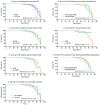Hereditary Hemorrhagic Telangiectasia (HHT) and Survival: The Importance of Systematic Screening and Treatment in HHT Centers of Excellence
- PMID: 33172103
- PMCID: PMC7694763
- DOI: 10.3390/jcm9113581
Hereditary Hemorrhagic Telangiectasia (HHT) and Survival: The Importance of Systematic Screening and Treatment in HHT Centers of Excellence
Abstract
Hereditary hemorrhagic telangiectasia (HHT), an autosomal dominant disease, is characterized by telangiectases and arteriovenous malformations (AVMs). Untreated AVMs, especially in the lungs-pulmonary AVMs (PAVMs)-can result in morbidity with a decreased life expectancy. We have investigated whether HHT patients, systematically screened for HHT-related organ involvement and treated if needed, have a similar survival as persons without HHT. We included all individuals screened for HHT between 2004 and 2016 with a genetically or clinically confirmed diagnosis (HHT group) or excluded diagnosis (non-HHT control group). The social security number was used to confirm status as dead or alive in December 2019. We included 717 HHT patients and 471 controls. There was no difference in survival between the HHT and the non-HHT control group. The HHT group had a life expectancy of 75.9 years (95% confidence interval (CI) 73.3-78.6), comparable to the control group (79.3 years, 95% CI 74.8-84.0, Mantel-Cox test: p = 0.29). In conclusion, the life expectancy of HHT patients systematically screened for HHT-related organ involvement and treated if needed in an HHT center of excellence was similar compared to their controls, justifying systematic screening and treatment in HHT patients.
Keywords: hereditary hemorrhagic; life expectancy; survival; telangiectasia; vascular malformations.
Conflict of interest statement
The authors declare no conflict of interest.
Figures




References
-
- Shovlin C.L., Buscarini E., Kjeldsen A.D., Mager H.J., Sabba C., Droege F., Geisthoff U., Ugolini S., Dupuis-Girod S. European Reference Network for Rare Vascular Diseases (VASCERN) Outcome Measures for Hereditary Haemorrhagic Telangiectasia (HHT) Orphanet J. Rare Dis. 2018;13:1–5. doi: 10.1186/s13023-018-0850-2. - DOI - PMC - PubMed
-
- McAllister K.A., Grogg K.M., Johnson D.W., Gallione C.J., Baldwin M.A., Jackson C.E., Helmbold E.A., Markel D.S., McKinnon W.C., Murrell J. Endoglin, a TGF-beta binding protein of endothelial cells, is the gene for hereditary haemorrhagic telangiectasia type 1. Nat. Genet. 1994;8:345–351. doi: 10.1038/ng1294-345. - DOI - PubMed
-
- Johnson D.W., Berg J.N., Baldwin M.A., Gallione C.J., Marondel I., Yoon S.-J., Stenzel T.T., Speer M., Pericak-Vance M.A., Diamond A., et al. Mutations in the activin receptor-like kinase 1 gene in hereditary haemorrhagic telangiectasia type 2. Nat. Genet. 1996;13:189–195. doi: 10.1038/ng0696-189. - DOI - PubMed
LinkOut - more resources
Full Text Sources

